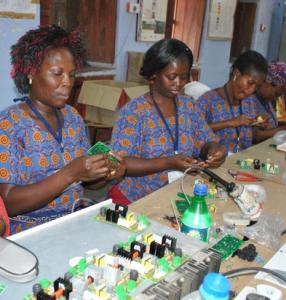Charitably, I'd say that most Americans are kilowatt, megawatt, even gigawatt complacent. After all, most of us routinely flick a switch to flood a dark room in our homes with bright, inexpensive light (let's toss in central air too). So it's easy to overlook the cruelty of the energy poverty enslaving over a billion people around the world. Fortunately, one untraditional - perhaps anti-traditional - college has developed a practical solution for this involuntary, resource servitude. Founded over forty years ago, the Barefoot College in Rajasthan, India now runs solar workshops for 100 rural grandmothers each year, allowing them to return to their villages and build precision solar cookers salvaged from bicycle parts, or solder together high tech solar panels to light up formerly dark, kerosene-choked shops and homes. The college has rigorous qualifications for anyone who aspires to become a solar tech. Are you elderly, illiterate, and lack a science background? No problem, you're in. A college degree: fuggedaboutit, you're handicapped by major cultural, ready-to-assemble, flat-pack Ikeatude! This college wants older women over 35, from remote, inaccessible, non-electrified areas. As college founder Bunker Roy says: "It makes sense to choose older women, since they are more loyal to their roots and less impatient to try out new pastures, which men do as soon as they're given a certificate." The only deal breaker: they must be backed up and sponsored by their village. The Indian government pays the airfare and room and board for every woman who comes to India for six months, said Roy. During the course, soon after listening to hands-on instructors and memorizing color-coded charts (which overcome the need to read or write) the women build their first projects, assembling solar power circuits, mobile chargers, solar units and lamps. See the video in the panel at right.

Helping more than 450,000 people
Once these solar technicians graduate, they return to their far-flung villages to short circuit the vicious cycle of energy poverty by replacing expensive kerosene and candles with cheaper solar power. Suddenly small, local businesses can stay open long after dark, prospering from freer-spending villagers; home cooking is also safer (fulsome cookstove fumes snuffed out); and, finally, kids learn more because they can study after dinner even though the sun has gone down. Anna Paul, a recent graduate from Brazil, told The Times of India, "I was very happy to travel to India. When I go back, I would be able to teach other people in my village. They are already constructing the building where I would teach," The successful program has already effected more than 50 countries, as 700 women engineers have fanned out across the world to bring light to more than 450,000 people in 1,000 villages and rural communities.


